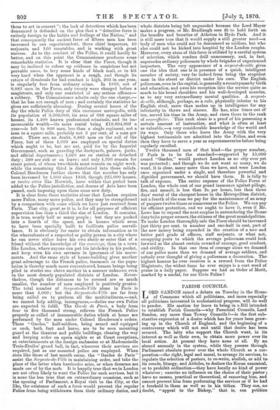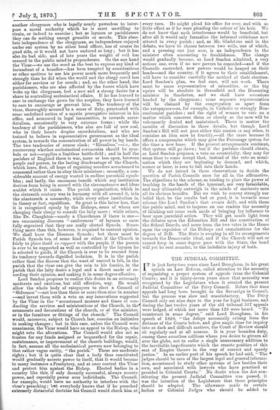PARISH COUNCILS. L ORD BANDON raised a debate on Tuesday in
the House' of Commons which all politicians, and more especially all politicians interested in ecclesiastical progress, will do well to ponder. His motion for leave to bring in a Bill intended_ to establish Parish Councils—why Parochial Councils, Lord Sandon, any more than Towny Councils ?—is the first sub- stantive expression of a desire which has for years been grow- ing up in the Church of England, and the beginning of a controversy which will not end until that desire has been secured. The laity who support the Church want, in its- interest as well as their own, to obtain more power over its- local action. At present they have none at all. By an absurd anomaly in the system, while they possess through Parliament absolute power over the whole Church as a cor- poration—the right, legal and moral, to arrange its services, to regulate the selection of pastors, to re-write, abolish, or add to its creeds, liturgy, and Articles, to declare the Koran canonical, or to prohibit ordination—they have locally no kind of power whatever ; exercise no influence on the choice of their pastor ; have no means, practical or theoretical, of removing him, and cannot prevent him from performing the services as if he had a freehold in them as well as in his tithes. They can, no doubt, "appeal to the Bishop," that is, can petition another clergyman who is legally nearly powerless to inter- pose a moral authority which he is most unwilling to strain, or indeed to exercise ; but as laymen or parishioners they can do nothing except grumble or secede. This abso- lute independence of the clergyman, an independence enjoyed under our system by no other local officer, has of course its good side, or it would not have endured so long ; but it has also its bad side, and of late years the weight of evil has seemed to the public mind to preponderate. On the one hand the Vicar—we use the word as the best to express any kind of incumbent of a benefice—has been tempted by conscientious or other motives to use his power much more frequently and strongly than he did when the world and the clergy cared less either for services or for creeds ; and, on the other hand, the parishioners, who are also affected by the forces which have woke up the clergyman, feel a new and a strong desire for a share in controlling eedesiastical affairs. If he has learned to care to exchange the gown for the surplice, they have learned to care to encourage or prevent him. The tendency of the vicar, thoroughly aroused to a sense of duty, penetrated with some undefined notion of a mystic prerogative inherent in his office, and armoured in legal immunities, is towards sacer- dotalism, occasionally in very extreme forms ; while the tendency of the parishioners, who also are full of new zeal, who in their hearts despise sacerdotalism, and who are trained to believe in representative government as the ideal system, is towards the concentration of all power in lay hands. The two tendencies of course clash; "Ritualism"—i.e., the controversy whether ecclesiastical ceremonies should be sym- bols or not—supplies a limitless battle-field ; and in half the parishes of England there is war, more or less open, between people and parson, to the lasting disadvantage of the Church, which loses, first, all hope of regaining seceders accustomed to command rather than to obey their ministers ; secondly, a con- siderable amount of energy wasted in endless parochial squab- bles; and lastly, the enormous benefit which any institution derives from being in accord with the circumstances and ideas amidst which it exists. The parish organization, which in the sixteenth century was in harmony with all around it, is in the nineteenth a monarchy, while every other institution is, in theory or fact, republican. So great is this latter loss, that it is recognized openly by the Bishops, some of whom are charging their clergy to consult the laity more ; while others, like Dr. Claughton—surely a Churchman if there is one— are summoning diocesan " conferences " of laymen so care- fully organized that they are really elected Synods. Some- thing more than this, however, is required to content opinion. We shall have the Diocesan Synods ; but there must be Parish Synods too, of some kind or other, if the Church is fairly to place itself en rapport with the people, if the parson is ever to be supported as well as controlled by the laymen he is selected to guide, if the Church is ever to be rescued from its tendency towards dignified isolation. It is in the parish rather than the diocese that the want of control is felt, in the parish that the vicar can give the rein to his fancies, in the parish that the laity desire a legal and a direct mode of re- cording their opinion, and making it in some degree effective.
Lord Bandon proposes to realize this desire in an extremely moderate and cautious, but still effective, way. He would allow the whole body of ratepayers to elect a Council of "Sidesmen"—not less than three or more than nine in number —and invest them with a veto on any innovations suggested by the Vicar in the "accustomed manner and times of con- ducting the services and ministrations of the Church, in the' ornaments and decorations of the church, or of the minister, or in the furniture or fittings of the church." The Council would, moreover, subject to Church law, exercise an initiative in making changes ; but in this case, unless the Council were unanimous, the Vicar would have an appeal to the Bishop, who might veto the alterations. The Council would also act as trustee for any funds assigned or bequeathed for the repair, maintenance, or improvement of the church buildings, would, in fact, assume all the ecclesiastical powers now belonging to that rather vague entity, "the parish." These are moderate rights ; but it is quite clear that a body thus constituted would gradually accrete power to itself, that it would become in many instances a Presbytery, and at once control the Vicar and protect him against the Bishop. Elected bodies in a country like this, if only decently successful, always accrete power, and especially power over individuals. The Council, for example, would have no authority to interfere with the vicar's preaching ; bat everybody knows that if he preached extremely distasteful doctrine his Council would check him at every turn. He might plead his office for ever, and with as little• effect as if he were pleading the colour of his hair. We do not know that such interference would be beneficial, but after all it would only formalize the informal criticisms now uttered in every parish ; and, as Mr. Gladstone said in the debate, we have to choose between two evils, one of which, and a pressing one just now, is an independence in the minister often amounting to freakishness. The change would gradually become, as Lord Bandon admitted, a very serious one, even if no new powers be conceded—and if the Councils succeeded, new powers would be heaped on their heads—and the country, if it agrees to their establishment, will have to consider carefully the method of their election. Lord Sandon's plan, we feel sure, will not work. There must be some representation of minorities, or the big squire will be absolute in Greenfield and the Dissenting minister in Smoketon, and we shall have secessions headed by the clergyman ; some separate representation will be claimed by the congregation as apart from the ratepayers—as, for example, in Catholic or strongly Non- conformist parishes ; and the right of women to vote on a matter which concerns them as closely as the men will be vehemently denied and maintained. There is matter for months of discussion in those details, but though Lord Sandon's Bill will not pass either this session or any other, it contains an idea sure to fructify,—all the more because it offers a compromise which may give the Patronage system for the time a new lease. If the present arrangements continue, that system will go down ; but if the parishes should obtain, as Lord Sandon proposes, a veto on eccentricity, they may for some time to come accept that, instead of the veto on nomi- nation which they are beginning to demand, and which, sooner or later, is sure to fall into their hands.
We do not intend in these observations to decide the question of Parish Councils once for all in the affirmative. The objections to the scheme, as tending to place the power of teaching in the hands of the ignorant, are very formidable, and may ultimately outweigh in the minds of moderate men all its obvious benefits. But we wish to convey strongly our belief that, be the results bad or good, it is towards some scheme like Lord Sandon's that events drift, and with them the public mind, and to impress on our readers the necessity of thinking out some such mode of bringing lay influence to bear upon parochial action. They will get much light from the debates upon the Education Bill and the constitution of the School Boards, and more from the two votes in the House upon the expulsion of the Bishops and examinations for the degree of D.D. The State is swaying in all its arrangements towards the Democratic ideal, and if the Church will not or cannot keep in some degree pace with the State, the bond will yet be rent asunder, to the indefinite injury of both.































 Previous page
Previous page